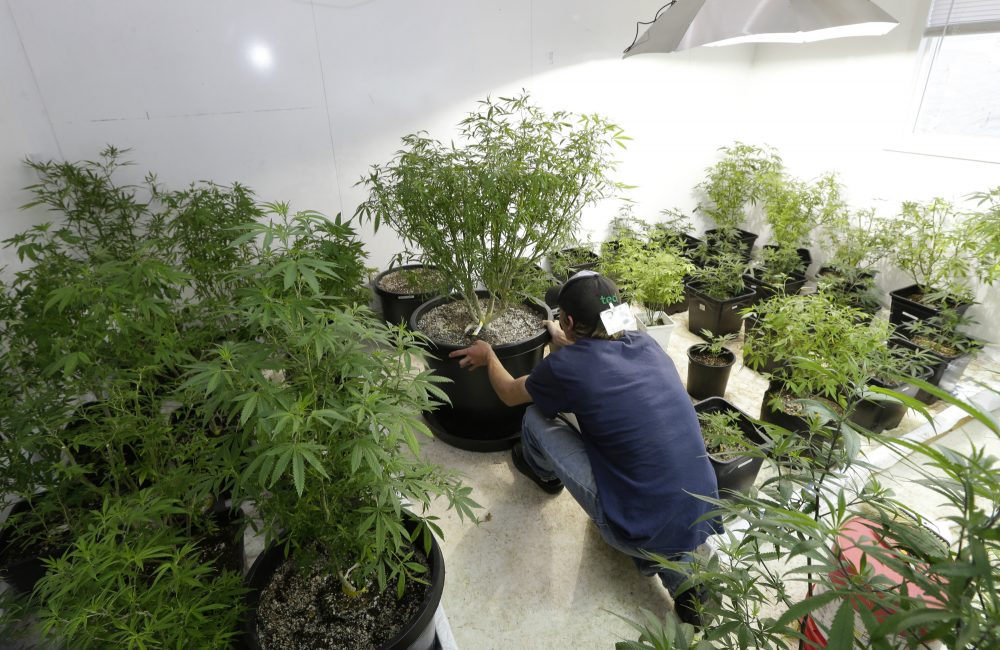Advertisement
The Potential Environmental Consequences Of Legalizing Pot In Massachusetts

Just two years after Colorado legalized recreational marijuana, there was a troubling and little-anticipated development: Pot-growing operations were consuming as much electricity as 35,000 homes. Almost half of Denver’s annual growth in power usage was attributable to indoor marijuana farming.
Growing pot is an enormously energy-intensive industry.
Now Massachusetts stands at the threshold of legalizing marijuana for recreational use. A recent poll by WBZ and UMass indicates that a majority of voters favor ballot Question 4, while only 40 percent say they’re opposed. And we’re not alone. Surveys say voters are soon likely to approve recreational pot in Maine, Nevada, Arizona and California.
Nationwide, the total carbon output from pot farming is already on a par with the output from all the cars, homes and businesses in the entire state of New Hampshire.
With the spread of medical marijuana, and a growing number of states now legalizing recreational use, all that additional power generation is having a measurable effect on greenhouse gas emissions. The increased energy demand is proving to be problematic in states like Colorado, where dirty coal is the predominant source of electricity. In California, where medical marijuana was legalized in 1996, researchers estimate its cultivation already accounts for about 3 percent of the state’s electricity usage. Nationwide, the total carbon output from pot farming is already on a par with the output from all the cars, homes and businesses in the entire state of New Hampshire.
So what is it about growing marijuana that uses so much more energy than other crops? Yielding the most desirable qualities requires very specific conditions that are most easily achieved indoors. Large-scale growers use thousands of very intense high-pressure sodium light bulbs to stimulate flowering and maximize potency. The heat produced by these lamps necessitates powerful cooling fans or air conditioning. Precise control of humidity is crucial to healthy plants, which entails more energy-hungry equipment. Drying the buds demands still more juice.
In states such as Washington and Colorado, where recreational weed has been legal for a while, growers and electric utility companies have started working on ways to bring down the amount of energy required. LED lighting, for example, has higher upfront costs but uses less energy and generates less heat. Growing pot in greenhouses rather than warehouses enables growers to take advantage of natural sunlight to supplement grow lights. The timing of lighting cycles to align with periods when there is less load on the grid enables some growers to lower their costs. And market forces will undoubtedly play a role. In a tremendously lucrative but also highly competitive business like marijuana, investors and developers will do whatever is necessary to maximize their profits — using less energy improves the bottom line.
In the public debate around our upcoming referendum, energy has been much less of a worry than that of kids discovering their mom’s special brownies. But in light of all the efforts the state has recently made to limit greenhouse gases, anything that might move us in the wrong direction deserves a closer look. Gov. Charlie Baker issued an executive order just a few weeks ago that specifically calls for the commonwealth to prioritize conservation and find ways to reduce electricity demand. The prospect of a large number of commercial growing operations runs counter to that strategy.
...[Massachusetts] could follow the example of Boulder County, Colorado, where licensed growers must either use renewable electricity or pay an extra two cents per kilowatt-hour into a fund that supports carbon offsets and research into sustainable marijuana cultivation practices.
There are some policies that the state could pursue to offset the increased carbon emissions from indoor cannabis agriculture. For starters, locking in solar power incentives for business will encourage growers to install enough solar panels to generate a significant fraction of the necessary electricity. And we could follow the example of Boulder County, Colorado, where licensed growers must either use renewable electricity or pay an extra 2 cents per kilowatt-hour into a fund that supports carbon offsets and research into sustainable marijuana cultivation practices. Massachusetts will collect a marijuana tax, and the Legislature should consider allocating some portion of those revenues toward subsidizing renewable energy. Regardless of what policies we implement, we need a predictable long-term regulatory environment that gives growers the confidence to make investments in sustainable technology.
Industrial marijuana farming may never be environmentally friendly. Even outdoors in ideal growing climates, there are issues of water use and pesticides. But at least we can take just a little consolation in knowing that all those thousands of pot plants will be drawing carbon from the atmosphere as avidly as people will be inhaling the smoke of their burning flowers.
